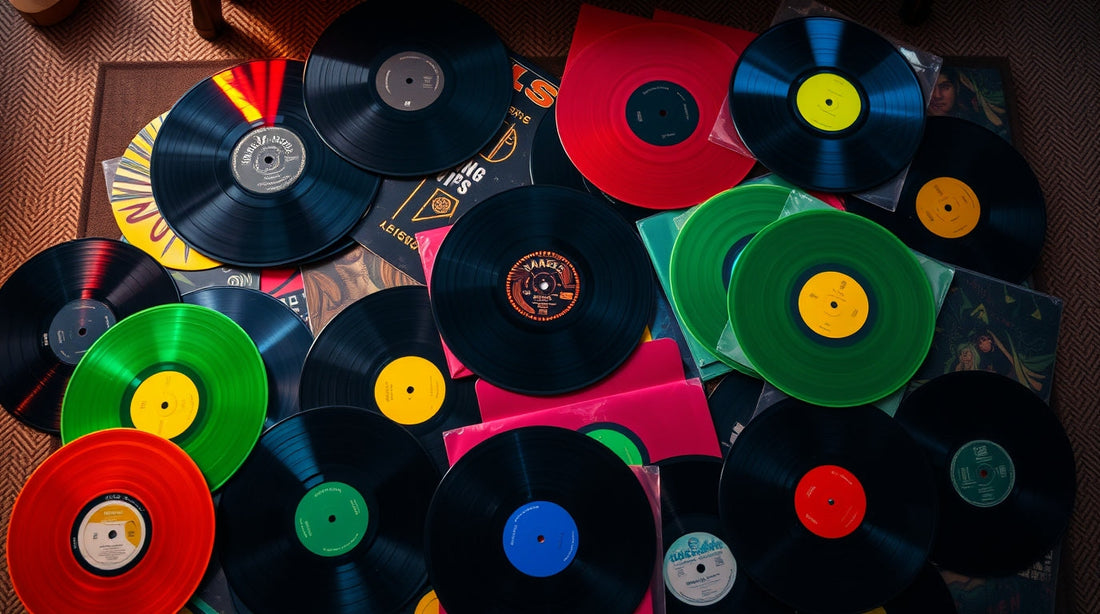
Share
Vinyl records have experienced a major resurgence in recent years, captivating audiophiles and collectors alike. Amid this revival, a hot debate continues among enthusiasts: are black vinyl records superior to their color pressed counterparts? Beyond the technical benefits, black vinyl records have an inherent aesthetic and nostalgic value. For many collectors, black vinyl represents the “classic” look of records—an icon of decades of musical history. While color pressings can be eye-catching and are often used as limited editions or special releases, the traditional black vinyl is celebrated for its association with quality and authenticity. The subtle simplicity of a black record is often seen as a canvas that highlights the album art and design, without the distraction of artificial coloration.
Superior Audio Quality and Purity
One of the most commonly cited reasons in favor of black vinyl is its impact on audio fidelity. Black vinyl is typically produced using a purer formulation of polyvinyl chloride (PVC) with fewer additives. The manufacturing process for black records has been honed over decades, and many experts assert that the lack of extra dyes and fillers in the material results in a cleaner signal path. This purity can lead to improved dynamic range and less noise during playback, offering an audio experience closer to the original recording.
“The traditional formula for black vinyl has long been favored by engineers for its consistency in delivering high-quality sound,” notes a detailed discussion on vinyl quality found on Discogs, a trusted resource for vinyl collectors.
Whats wrong with color?
There are ways to ensure a quality color pressings and the number of ways grows as technology enviably gets better. By now most additives used for color bond well with the waxes and PVC use in vinyl, however these is still plenty of room for error when combining colors. The more color, the more likely the added dye ingredients will not work well with each other. Additionally while there may be nothing wrong with the record, many experts say diffrent colors ingredients will vibrate differently creating a unique sound than the original recording. Most of the time the differences are not noticeable by ear but some colors are.
 Consistency in Manufacturing
Consistency in Manufacturing
Black vinyl has a long history as the industry standard, and with that comes a refined manufacturing process. Over decades, pressing plants have developed optimized methods for producing black vinyl records with uniform weight, thickness, and quality. This consistency minimizes the risk of warps, surface noise, and other playback issues that sometimes occur with colored vinyl, where the inclusion of pigments can affect the material properties.
According to experts featured on Vinyl Me, Please, the tried-and-true techniques used for black vinyl not only enhance sound quality but also contribute to a record’s longevity and durability.
Durability and Longevity
When it comes to long-term preservation, black vinyl records often outperform color pressings. The additional pigments in colored vinyl can sometimes compromise the structural integrity of the record. Some specific colors like white for example require pigments that can soften a record. To the contrary, black pressed vinyl often uses carbon for its color which can improve the strength of vinyl. This can be especially important for collectors and audiophiles who invest in large quantities or rare pressings, where maintaining the condition of the record is paramount. Especially in older presses.
Industry Trends and Expert Opinions
It’s important to note that while colored vinyl can offer a unique visual appeal and sometimes serve as a marketing tool for special editions, many industry professionals advocate for black vinyl when performance and longevity are the primary concerns. In discussions and feature articles on The Vinyl Factory, industry insiders note that many high-end pressings still favor black vinyl, citing its proven track record and consistent performance across numerous genres and pressings.
Conclusion
While both black and color pressed vinyl records have their own charm and place in the world of music collecting, the technical advantages of black vinyl—from improved audio quality and manufacturing consistency to superior durability—make it the preferred choice for purists and serious collectors. The legacy of black vinyl is built on decades of refinement and an unwavering commitment to sonic excellence. Whether you’re a longtime collector or just beginning your journey into the world of vinyl, understanding these differences can help you make more informed choices about your collection.
Embracing the timeless appeal of black vinyl means appreciating not just the music, but also the rich history and engineering excellence that go into every record. Whether you’re chasing the purest sound or simply a piece of musical heritage, black vinyl remains a benchmark of quality in an ever-evolving industry.
References
1. Discogs – An extensive resource on vinyl records, discussing the traditional formulation and audio quality benefits of black vinyl.
Discogs Vinyl Quality
2. Vinyl Me, Please – A trusted guide and community for vinyl enthusiasts, with insights on manufacturing processes that favor black vinyl.
Vinyl Me, Please Manufacturing Insights
3. Analog Planet – A website dedicated to audio equipment and vinyl, offering expert opinions on the durability and technical merits of black vinyl.
Analog Planet on Vinyl Durability
4. Stereophile – Known for its high-fidelity reviews, Stereophile frequently explores the collector’s value and sonic integrity of black vinyl records.
Stereophile Legacy of Vinyl
5. The Vinyl Factory – Provides in-depth articles and interviews with industry experts who affirm the enduring preference for black vinyl in high-quality pressings.
